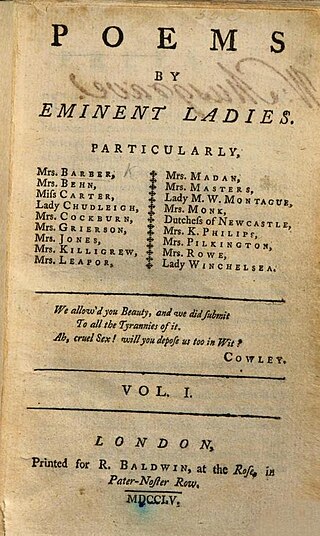Related Research Articles

Henry Fielding was an English writer and magistrate known for the use of humour and satire in his works. His 1749 comic novel The History of Tom Jones, a Foundling was a seminal work in the genre. Along with Samuel Richardson, Fielding is seen as the founder of the traditional English novel. He also played an important role in the history of law enforcement in the United Kingdom, using his authority as a magistrate to found the Bow Street Runners, London's first professional police force.

Jonathan Swift was an Anglo-Irish writer who became Dean of St Patrick's Cathedral, Dublin, hence his common sobriquet, "Dean Swift".

This article contains information about the literary events and publications of 1712.
This article contains information about the literary events and publications of 1708.

Richard Owen Cambridge was an English poet.
Jonathan Smedley (1671–1729) was an Anglo-Irish churchman who became Dean of Clogher in 1724. He was an opportunist and satirical victim who engaged in a polemic with Jonathan Swift and the forces of the Tory party.
Francis Elrington Ball, known as F. Elrington Ball (1863–1928), was an Irish author and legal historian, best known for his work The Judges in Ireland 1221–1921 (1926).
Nationality words link to articles with information on the nation's poetry or literature.

Nationality words link to articles with information on the nation's poetry or literature.

Mary Barber, Irish poet, was a member of Swift's circle. She has been described as "a domestic, small-scale, early eighteenth-century poet of charm and intelligence, but also an incisive, often satirical commentator on social and gender issues."
Thomas Cooke, often called "Hesiod" Cooke, was an active English translator and author who ran afoul of Alexander Pope and was mentioned as one of the "dunces" in Pope's Dunciad. His father was an innkeeper. He was educated at Felsted. Cooke arrived in London in 1722 and began working as a writer for the Whig causes. He associated with Thomas Tickell, Ambrose Philips, Leonard Welsted, Richard Steele, and John Dennis. Cooke is the source of one of the primary biographies of John Dennis, which he wrote in Latin.
This article is about the particular significance of the year 1737 to Wales and its people.
Robert Freind (1667–1751) was an English clergyman and headmaster of Westminster School.

Francis Luttrell (1628–1666) of Dunster Castle, Somerset, was an English lawyer and politician who sat in the House of Commons at various times between 1656 and 1666.

Henry Fownes Luttrell, of Dunster Castle, Somerset, was High Sheriff of Somerset from 1754 to 1755 and a Member of Parliament for the borough of Minehead from 1768 to 1774.

Alexander Luttrell of Dunster Castle, Somerset, was an English politician and land-owner who served as Member of Parliament for his family's pocket borough of Minehead from 1727 until his death. He was the last in the male line of the Luttrell family, which had owned Dunster Castle since 1376.

Margaret Fownes-Luttrell was a British heiress, the wife of Henry Fownes Luttrell. She was the heiress of Dunster Castle, under the stipulation in her father's will that her husband should take the additional surname of Luttrell. Four portraits of her exist in Dunster castle and a fifth at Bathealton Court.

John Fownes Luttrell was an English Tory politician from Dunster Castle in Somerset. Like many previous generations of Luttrells since the 16th century, he was a Member of Parliament (MP) for Minehead, his family's pocket borough near Dunster. He sat in the House of Commons of Great Britain and then in the House of Commons of the United Kingdom from 1774 until his death in 1816, except for a few months in 1806–07.
Thomas Fownes Luttrell from Dunster Castle in Somerset was an English officer in the British Army and briefly a Tory politician. Like many previous generations of Luttrells since the 16th century, he was a Member of Parliament (MP) for Minehead, his family's pocket borough near Dunster.
Cutts Barton (1706–1780) D.D. was an English cleric, Dean of Bristol from 1763 to 1780.
References
- 1 2 Swift, Jonathan (1808). "To Mr. Thomas Beach". The Works of the Rev. Jonathan Swift, D.D. Vol. XIII. London: Nichols and Son. p. 172. Retrieved 14 September 2011.
![]() This article incorporates text from a publication now in the public domain : "Beach, Thomas (d.1737)". Dictionary of National Biography . London: Smith, Elder & Co. 1885–1900.
This article incorporates text from a publication now in the public domain : "Beach, Thomas (d.1737)". Dictionary of National Biography . London: Smith, Elder & Co. 1885–1900.